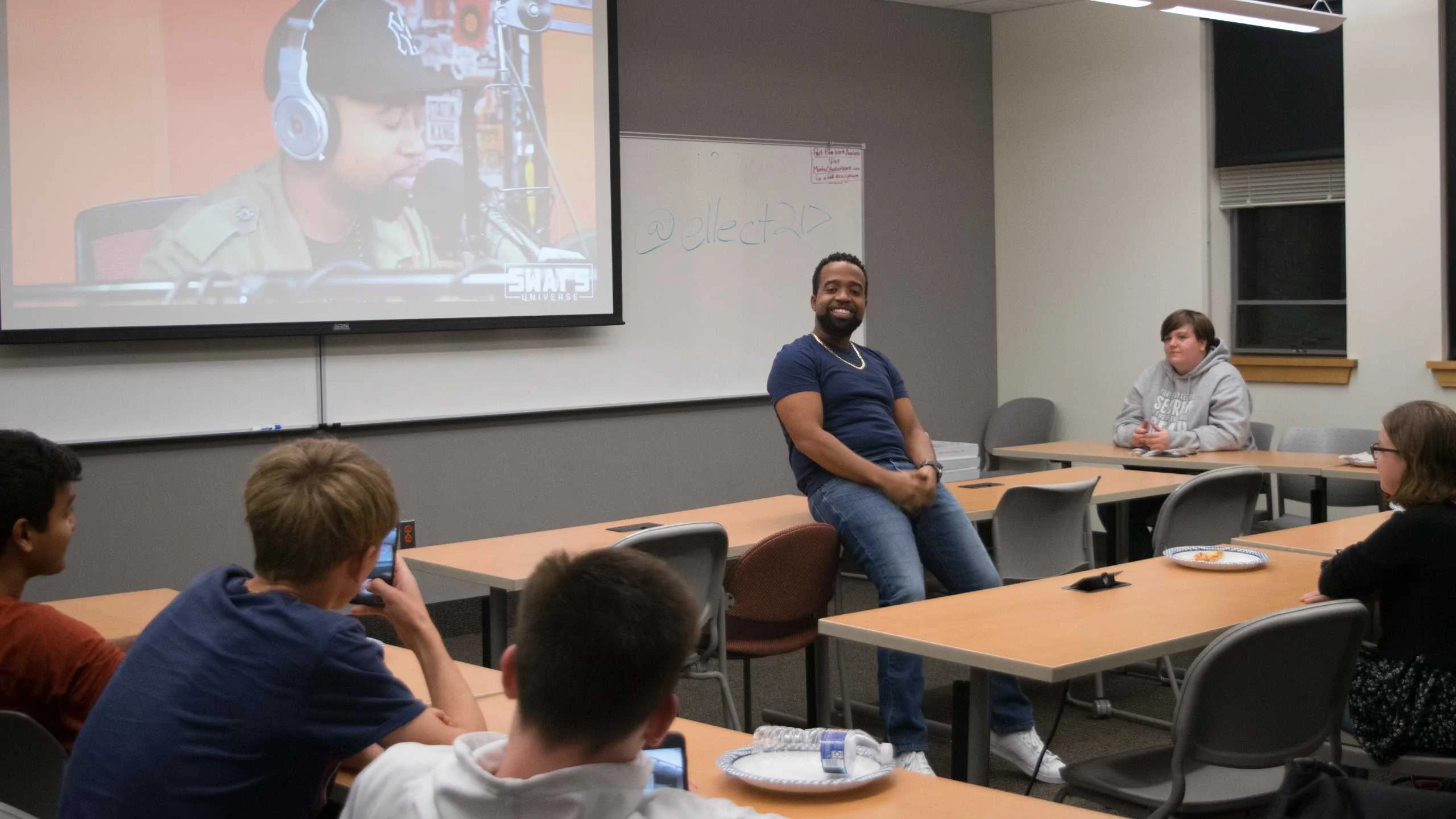
Explore special topics that interest you through your First-Year Seminar, the academic core of Arcadia’s First-Year Experience. These small, interactive classes—limited to approximately 18-20 students—have examined everything from Harry Potter, to crime scene evidence, to the 1960s, and more.
Sample Courses
Making Moves: Strategic Nonviolence and Civil Disobedience in American Culture
Throughout American history, strategic nonviolence and civil disobedience have led to significant transformations in political, economic, and social spheres. The strong force of nonviolent resistance in American culture, represented through actions such as peaceful protests and boycotts, has changed the course of history. Civil rights and liberties often compose the platform of strategic nonviolence and civil disobedience as citizens exhibit resiliency in their efforts and motivations to change the status quo. Students investigate why and how civil resistance works, noting both successes and failures across several decades from the Civil Rights Movement to current day. Using primary and secondary sources, students expose the role of the protester in initiating change through demonstrations, boycotts, and other nonviolent measures.
Investigating (In)Equality in Health Care
Should health care be an individual right or a commodity? Do we live in a society or an economy? Why doesn’t America have Universal Health Care? What would happen if it did? Students explored the challenges to and constraints on the pursuit of health care equity in the United States. Using contemporary examples, film, discussion, and self-inquiry, this course encourages students to critically analyze the distribution of medical care and its impact while discovering their personal ethic with regard to healthcare access. The class also explores the COVID-19 pandemic as a living example of what happens when the healthcare playing field is leveled—who gets access now?
The Ethics of Harry Potter
Do you wish you could apparate, play quidditch, or ride a hippogriff? In this seminar, students look at the Harry Potter books—not only as compelling stories, but as an opportunity to examine their own values and notions of “right” and “wrong.” The world isn't split into good people and Death Eaters; we've all got both light and dark inside us. What matters is the power we choose to act on. That's who we really are.
The Shock of the Sixties
The 1964 Civil Rights Act. The Feminine Mystique. Haight-Ashbury. Woodstock. Flower power. The Vietnam “conflict.” “The White Album.” The assassinations of JFK, RFK, and MLK. The Graduate. The lunar landing. All of these are part of one of the most interesting decades in recent American history – the 1960s. The course is not simply about sex, drugs, and rock and roll—we’ll read, view, and listen to a variety of texts in art, history, film, music, politics, and science of the time in order to understand how all of these areas intersect. Each student will work extensively on an individual topic that interests them.
Funny Women Writing Themselves
Tina Fey, Lena Dunham, and Mindy Kaling have found success as creators and stars of their own television series. In recent years, these A-list comedians have made the shift from television screens to bookshelves, publishing best-selling memoirs. Mixing elements of stand-up routines and self-help seminars, these authors detail the ups and downs of their personal and professional lives, offering their readers the opportunity to laugh at and learn from their failures and successes. In this course, we will view these memoirs not only as beach reads but also as cultural artifacts. We will put these literary works into larger cultural contexts: personal narratives in public discourse, celebrity worship in popular culture, and women’s representations in mainstream media. In short, we will take comedy seriously.
From Rags to Riches (and Back Again)
Rags to riches. Self-made millionaire. House with a white picket fence. These are all pieces of the “American dream”—that master narrative that Americans like to tell about who we are and what we believe. But there’s also a darker side to the story. Even though the American dream claims to be universal, it’s actually highly raced, classed, and gendered, and from some perspectives it even resembles a nightmare. Throughout the semester we’ll read novels and watch films that offer different perspectives on American dreams and American nightmares. As we explore the narratives articulated by everyone from the nation's founders to the stars of The Real Housewives franchise, we’ll ask what their accounts reveal about Americans and how these stories shape our sense of identity and possibility.
Expose Yourself to Art!
Why are some objects defined as art and others not? Who decides, and why does it matter? Through a combination of looking at, writing and talking about, and creating art, students in this course will explore the question “What is Art?” Close attention will be paid to how artists, curators, and scholars have answered these and other art related questions throughout history. The course will include field trips to local galleries and museums, and will feature lectures and presentations on a wide variety of art mediums and movements. Special focus will be the mural arts/street art and photography, along with trips into Philadelphia to experience art in the city firsthand. Students can expect to gain vital skills that translate to all facets of university learning and scholarship, while being charged to express and defend their artistic points of view using visual, written, and oral means.
Up Your Game
Do you play video games? Have you ever wanted to learn more about them, the history behind them, how they have changed society or made impacts in the culture of the United States? This course will focus on the impact that video games have had on our society in various aspects. We begin with a survey of the video game world and discuss its humble beginnings from Pong, to Mario, to Halo, and beyond. From there, we will look at historical based video games and compare them to actual events in history, and analyze how popular culture has been affected by our penchant for video games. Finally, we’ll explore the cultural effects video games have had on our society from opposing viewpoints.
The Hunger Games and Social Reality
The power of a good story lies not only in its ability to entertain, but also in its capacity to educate. They resonate on a deeper social, cultural, political, and even personal level and leave us changed. The Hunger Games and its sequels are great examples of stories that hold greater meaning for those willing to delve a little deeper—which is exactly what this class requires of you. After critically reading the novels, you’ll begin to explore how the dystopian future that Suzanne Collins envisioned is actually a reflection of our current social reality. Through weekly themed discussions, research, critical thinking exercises, and personal exploration, we will see just what this series reveals about who we are and how we affect the world around us. Some of the topics we will discuss include: gender roles, the environment, economic disparity and global inequality, revolution, war and violence, political oppression, reality TV, consumerism, and love. Volunteer as tribute, if you dare.
Seems Legit: What’s Real and What’s Fake on the Internet
Fake news. Deep fakes. Rumors, hoaxes, lies, and propaganda. It’s easier than ever to find information—and misinformation—thanks to the constant evolution of media and technology. So, how do we know what to believe? What strategies can we use to navigate the media landscape and learn about what is happening in the world around us? By studying how and why people react to and spread misinformation and by critically analyzing media coverage of current events, students will practice media and information literacy skills that they need to be savvy and well-informed citizens. Students will also examine their own relationship with the internet, social media, and news, and develop skills to be more intentional about their online behavior.
Reading Between the Rhymes
This is a discussion-based course that examines the history and complexity of hip-hop culture, its diversity, and role in social justice efforts around the world. Elements of hip-hop culture (rap, DJ, graffiti, and breakdancing) and mass media (including music, television, and film) will be used as tools to critique what we learn and communicate in our society about culture, race, social class, religion, gender, sexual orientation, and more. We will examine the influence of hip-hop culture on our critical consciousness for social change and use our individual and collective creativity to explore solutions for a more equitable society.
Bodies in Motion: Foundation for Physical Therapy
What is movement? What is the relationship between anatomical structure and function? How is movement acquired? What alters movement? What is physical ability and disability? This seminar introduces students to the science of movement and bioengineering as tools for analysis and adaptation. Visual observation of different kinds of human motion within varied locations and contexts serves as the framework for discussion of the individual’s, society’s and science’s approaches to the concept of physical ability. Strategies to address mismatches in physical ability and environmental demands underscores the seminar topics as students are guided toward an understanding of physically active individuals.
Questioning Gender
This course questions how we think about gender. When a baby is born, the first question asked is usually, “Is it a boy or a girl?” Is gender just about biology, or are there other forces at play? Focusing on the U.S., we’ll explore how the idea of two “opposite” genders, each with their prescribed attributes, has been culturally enforced through marketing, media, and other avenues. We’ll also look at how gender has been redefined during the last 50 years, as terms such as transgender, intersex, gender-queer, and gender-fluid have entered mainstream conversation. The course includes discussion, readings, videos, guest speakers, and a field trip to downtown Philadelphia.
Theater in Philadelphia: An Introduction
There's nothing wrong with feel-good Broadway-style musicals. But at its finest, theater is a serious art that provokes ambitious thinking, self-examination, and social engagement. This seminar exposes students to thoughtful dramatic productions on the Arcadia campus and around Philadelphia, explores the creative process involved in staging serious drama, and examines how Philadelphia-area artists are using the stage to engage with the vital political, cultural, and social questions of our time. Students attend performances, speak with theater artists, and develop critical skills for analyzing what is seen on stage.
Naked Words: Intimacy of Poetry
Bring your voice to the table. Reading poems aloud, sharing original work, and learning the art of critique will allow us to share dreams and disappointments. Our seminar, based on published and unpublished poems—yours and others'—will help you understand poetry's role in healing, creativity, and inspiration. We'll also explore how poetry can function as a form of celebration, mourning, or social critique. No prior knowledge is necessary; this course is open to both experienced and inexperienced writers.
Gender Inequality & Intersectionality
This course will explore the nature of gender inequality and intersectionality in two entertainment industries: film and popular music. Specifically, it will examine the power (or lack thereof) that women hold, both in front of the camera as actors and as musicians on stage, and behind the scenes as directors and producers in each medium. Specific women, who have established a powerbase in each medium will be identified, and the reasons for their success analyzed. The concept of intersectionality will also be explored, which examines inequalities originating from the interplay of race, class, gender, and sexual orientation.
Fabulous Foodie Culture
This course aims to explore and study our national and global obsession, appreciation, and criticism of food and the culture surrounding it. Students will engage in critical analysis of journalistic writing, literature, and multitudinous media products. Students will conduct a food journal, write a food autobiography, write a critical analysis and research paper on an identified food issue, and participate in a group project that highlights a particular cuisine and its history.
From Tent to Stage: Contemporary Circus in America
When Ringling Brothers announced its closure, many thought that the circus was over. Perhaps traditional circus is ending, but a new, exciting genre is taking its place: Contemporary circus strips away the grandeur of traditional circus and puts the raw art onto a new canvas—a theater, concert hall, converted church, even a garden. It’s an intimate, connected, intensely personal adventure for the audience that magically combines a multitude of performing arts disciplines. This course explores the rich history of circus, from its origins in the rituals of primitive man through its evolution into this exhilarating new genre. We’ll investigate why contemporary circus is flourishing in other countries, and why it has taken so long to pitch its tent here in America. To gain further insight, students will attend local performances, meet artists working in the genre, and even try their hand at training like a circus artist.
Advocacy in Action
What skills will you develop in college to prepare you to serve as a force for social change—and how can you start right now? The college years are often a time to develop social consciousness, practice critical thinking and dialogue, and dream big. We will intentionally spend our time that way in this course. Writer June Jordan first used the popular phrase “We are the ones we’ve been waiting for” in a poem presented to the United Nations. You and your classmates will interpret the phrase for yourselves, and take some action. This course will give you the opportunity to study a wide range of approaches to advancing social change, partner with a community-based organization, and design and implement an advocacy project. You and your classmates will develop the skills to thrive as Arcadia students, and we will build a community intended to serve as a support system long after the course concludes.
Tyrants, Cult Leaders, and Heads of State: Unpacking the Myth of the Perfect Leader
There are leaders who inspire us to take risks, who we empower to lead us, and others who are responsible for some of the greatest atrocities in the world. What’s the difference between a good leader and a terrible one? Do Nelson Mandela and Charles Manson have any common leadership skills? Are Oprah and Margaret Thatcher cut from the same cloth? This class will explore traits-based and skills-based leadership theories and dissect the leadership resumes of some of the world’s best (and worst) leaders. From our study we will determine how to build leadership capacity—and a cult following.
Sherlock Holmes: A Study in Character
Who is Holmes? Is he Doyle's egotistical and flawlessly brilliant consulting detective stalking the fog-swirled, cobblestoned streets of Victorian Britain? The far more vulnerable and complex character of page, stage, and screen—susceptible even to the risks of love—appearing in the century to follow? Is he the high-flying, fisticuffing, texting superhero translated into our contemporary moment by Robert Downey, Jr. and Benedict Cumberbatch? Why does this odd, infuriating, eccentric man continue to shape our concepts and standards of intelligence, strength, self-discipline, and self-worth? Why does he use drugs? Is Holmes a self-centered madman or a true patriot? In this course, we will peer through the magnifying glass, comparing the original with films, television shows, literature, comic books, and other artistic interpretations to investigate the identity of Sherlock Holmes. Students will transport themselves to the past for answers, write a piece of fan fiction or a letter to Holmes—and perhaps even meet the world’s greatest consulting detective in the flesh.
Citizenship and the Law
As a citizen of the United States, do you know why every state in the union has a 21-year-old drinking age? Why our money reads “In God We Trust?” Why you can burn the American flag? This seminar explores the characteristics of an engaged citizen by studying milestone U.S. Supreme Court cases, which will provide you a better understanding of our government, history, and cultural norms. The class will complete a civics project called “Did You Know?,” which will help create discussion on campus about interesting topics you choose. To explore our culture, we will travel to Washington, D.C. or sites in Philadelphia.
Must Love Dogs: An Exploration of the Human-Canine Relationship
In recent decades, our relationships with our canine companions have changed radically. Unlike prior generations, both dog-owners and scholars today accept that dogs possess intelligence, have emotions, and can communicate. Current studies indicate that dog-owners are generally healthier and happier than most. How do we know this? How have dogs and humans evolved together and changed each other? What are the social and psychological ramifications of living with dogs? These are just a few of the many questions we will tackle as we learn from biologists, anthropologists, psychologists, historians, ethologists, and each other about the human/canine relationship.
Fabulous Beasts, Remarkable Creatures
Why are fantastical creatures so popular, and what can a legacy of past “animal” stories illuminate about ourselves now? We’ve looked to these stories to understand animals, but can they also help us recognize what it means to be human? As a class, we’ll explore a variety of literary and artistic works: medieval beast tales, 17th and 18th-century animal satires, and recent fantasy literature (including J.K. Rowling and J.R.R. Tolkien). Our purpose will be to examine how these works present the values, challenges, and unique human experiences of their times, and how they continue to resonate with and shape contemporary culture.
The Hero’s Journey: Ancient Myth to Modern Story
Harry Potter, Frodo Baggins, and Katniss Everdeen all have one thing in common: they are all heroes, and their authors all used a theory known as the Monomyth to create their stories. Though these three heroes go on vastly different journeys, in this class we'll examine the ways in which the steps of their journeys are actually the same. This heroic structure can be applied to just about any story—from ancient mythologies to the latest novel, television show, or movie—to capture your interest. Through the study of mythic patterns, psychology, and even modern day theories of the heroine's journey, this class will allow you to decode the ancient structure of any story and prepare you to write your own. Anyone who ever wanted to begin understanding the way J.K. Rowling, J.R.R. Tolkien, or Suzanne Collins plotted their stories, this class is for you.
Moving Beyond Allyship: Anti-Racist Work
In this experiential course, one day of class each week will include participation in the Living Our Values Experience—an antiracism project on campus that includes faculty, staff, undergraduate students, and graduate students in both racial affinity groups and multiracial working groups to address personal, interpersonal, and institutional levels of change. Students will investigate the ways that racism has a cost for everyone, and question the idea that dismantling white supremacy is a zero sum game. Drawing on the concept of "the solidarity dividend" and moving beyond allyship as the main way of thinking of cross-racial collaboration and action, the course uses Heather McGhee's (2021) groundbreaking new book, The Sum of Us: What Racism Costs Everyone and How We Can Prosper Together, as its core text.
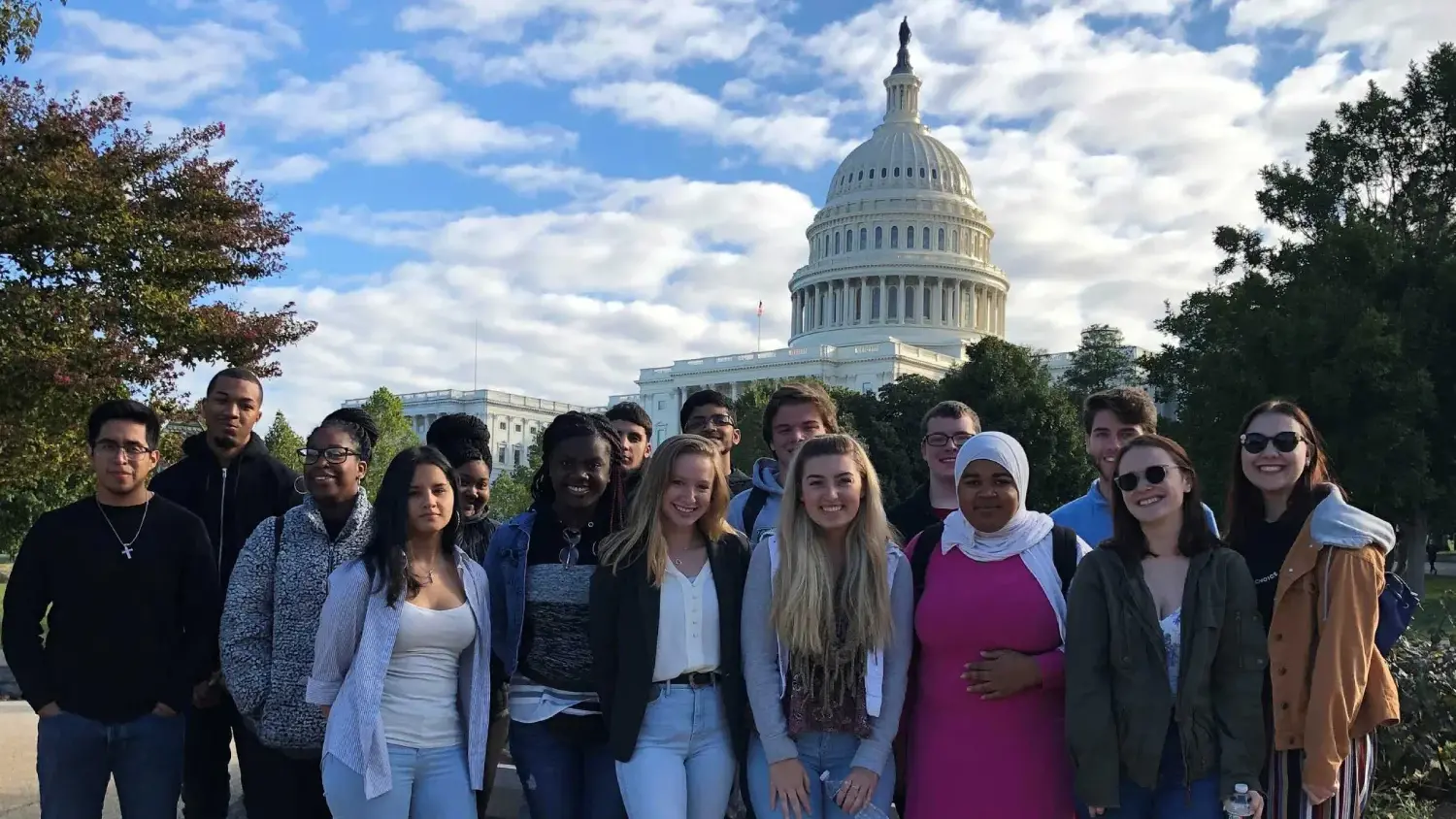
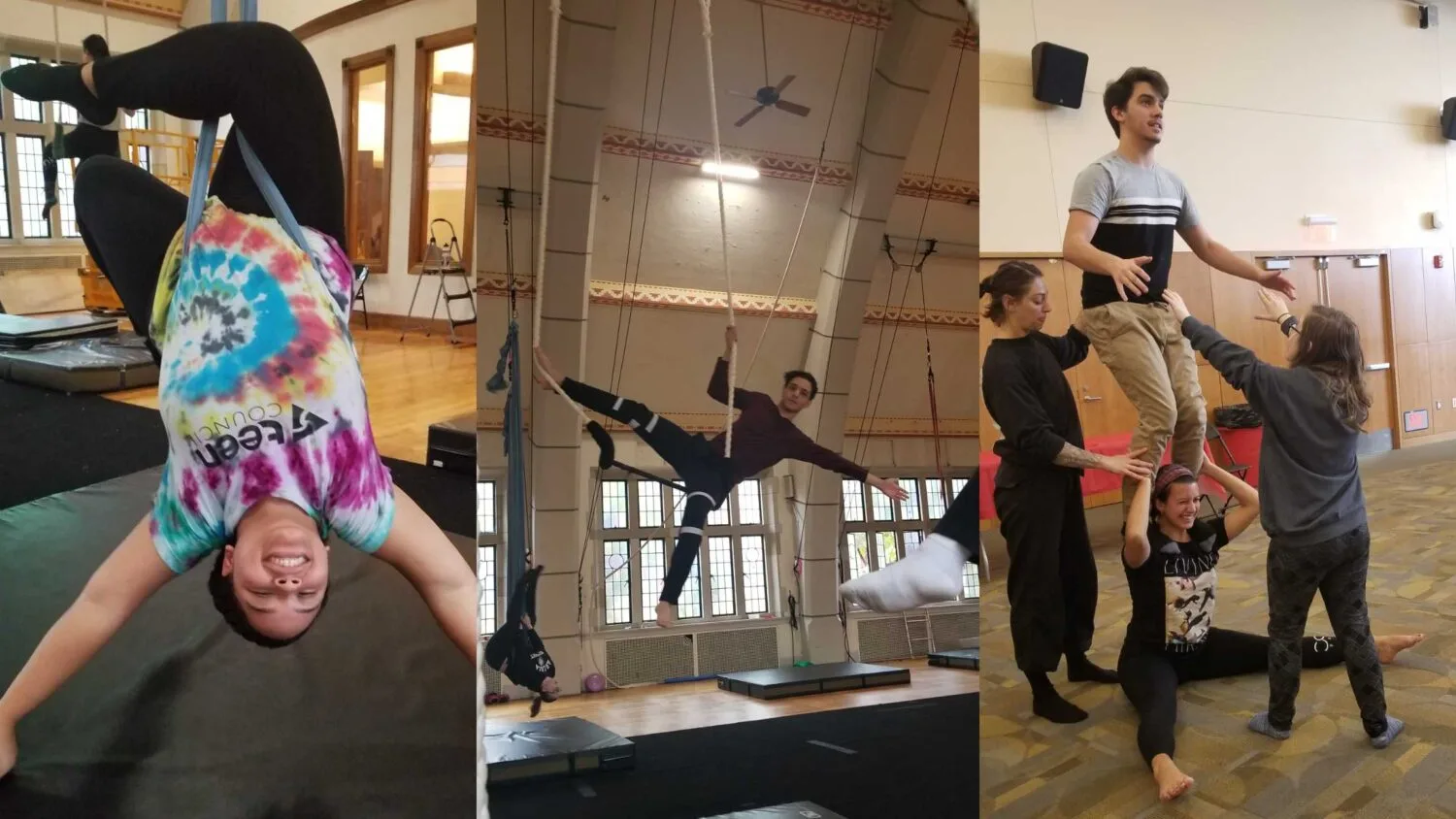
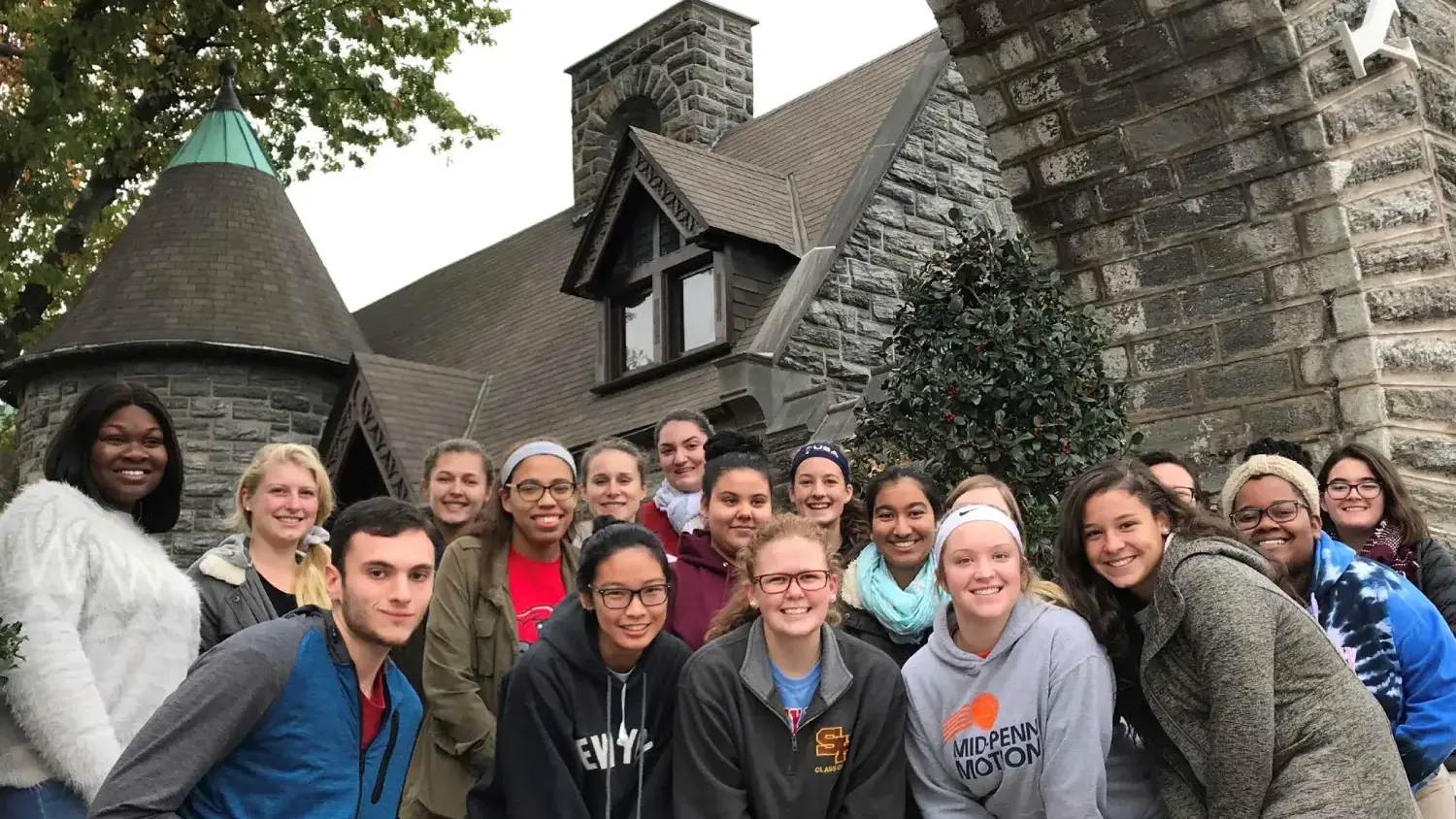
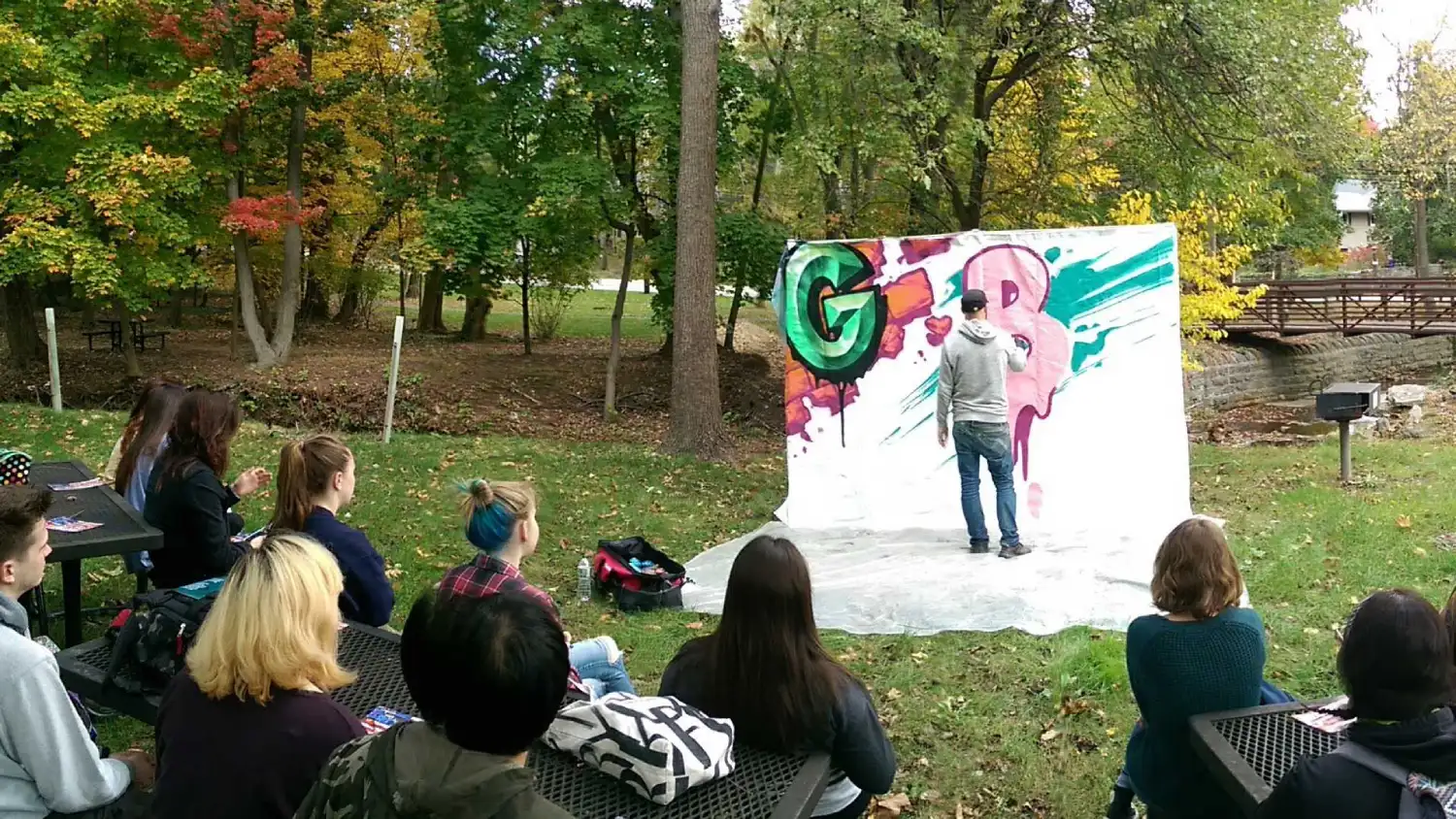
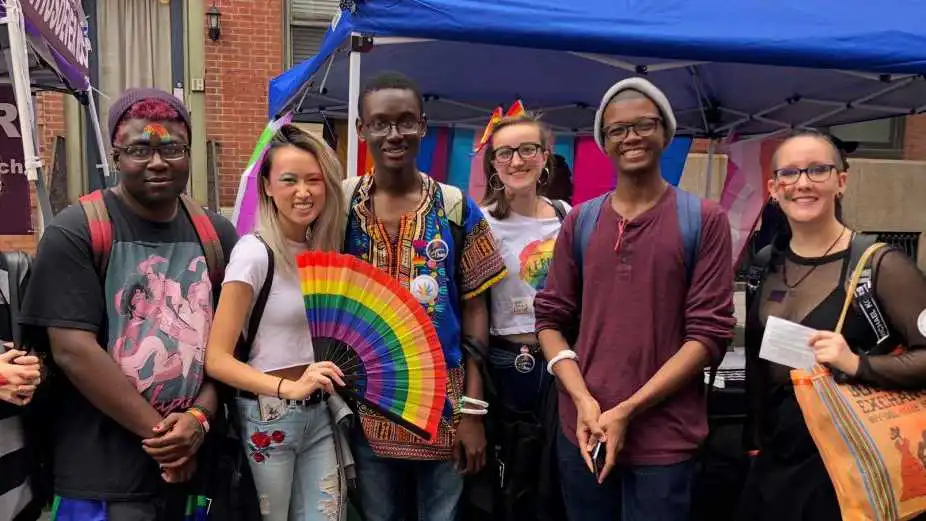





Citizenship and the Law
From Tent to Stage: Contemporary Circus in America
From Rags to Riches (and Back Again)
Expose Yourself to Art!
Questioning Gender
Citizenship and the Law
From Tent to Stage: Contemporary Circus in America
From Rags to Riches (and Back Again)
Expose Yourself to Art!
Questioning Gender
Learning Communities
First-year students are part of a Learning Community—typically in tandem with your seminar—which combines experiential learning and community-building through exciting activities and field trips (examples below). Your Learning Community will help you make friends, have fun, and extend your classroom knowledge as you explore intellectual questions in real-world situations.
Off Campus
- Traveling to Philadelphia, New York City, and Washington D.C. to visit museums and other cultural sites.
- Attending the Philadelphia Film Festival.
- Attending Broadway musicals or other theatrical productions.
- Visiting local courthouses.
- Cheering for the home team at a Flyers’ game.
- Competing in a scavenger hunt.
- Taking archery lessons.
- Braving a haunted house.
- Visiting a wolf sanctuary.
- Attending the Harry Potter Festival, ComiCon, OutFest, etc.
- Enjoying a group dinner together at a restaurant.
On Campus
- Hanging out, watching movies, and enjoying pizza together.
- Hosting “study and snacks” sessions during midterms and finals.
- Creating ceramic bowls to donate to the Empty Bowl Benefit Dinner.
- Hosting board or video game tournaments.
- Inviting experts and guest speakers to campus.
- Attending Arcadia theater productions or musical performances.
- Exploring art exhibitions at on-campus galleries.


